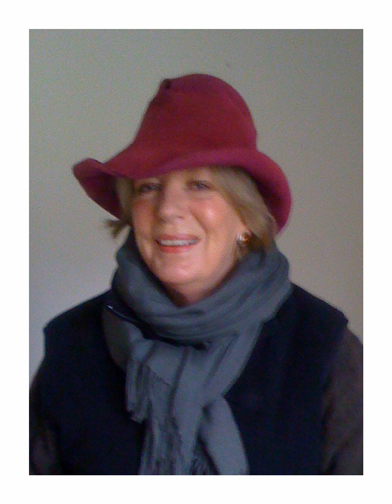 I first met Quentin Crisp at a lunch party around 1976 and was instantly mesmerized. There were probably about fifteen people there and he held court effortlessly. We were all hanging on every pearl of wisdom...on every brilliant observation. I had never heard of him but was told that he had written the famous The Naked Civil Servant, which had recently been made into a film for television starring John Hurt. I bought the book the next day and adored it. I first met Quentin Crisp at a lunch party around 1976 and was instantly mesmerized. There were probably about fifteen people there and he held court effortlessly. We were all hanging on every pearl of wisdom...on every brilliant observation. I had never heard of him but was told that he had written the famous The Naked Civil Servant, which had recently been made into a film for television starring John Hurt. I bought the book the next day and adored it.
As he wrote over and over again that he couldn't imagine being ex-directory or not answering the telephone in case "you know who" might be on the line, I took him at his word and called him up to tell him how wonderful the book was. He answered in that smooth silken voice that I was to hear many times over the next several years, "Oh yesssss?" I stuttered and gushed that I'd met him some weeks ago and that I had just finished his book and thought it was marvelous.
As I was speaking, it suddenly popped into my head to ask him if he might like to come for dinner one evening. We lived quite near each other, I explained. "That would be lovely", purred Mr. Crisp. I have never heard a voice like his. "Well, how about Tuesday?", I said. Then the unforgettable reply, "I'm working during the day, but I'm free at twilight." I think I fell head over heels in love at that moment.
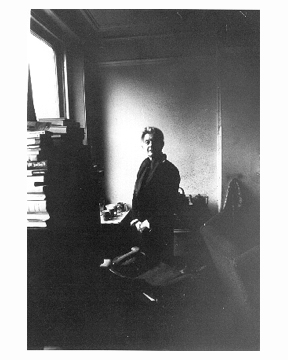 Anyway, he did come, and it so happened that I was suffering from an appalling case of unrequited love, having been dumped from a great height by the cad in my life at the time. I found myself pouring my heart out to him. One could imagine that he might have been entirely indifferent to this age-old, ho hum, tedious tale...as Frank Sinatra sang, “…unrequited love's bore and I've got it pretty bad"...but not a bit of it. He gave me the best advice of all. While everyone else (my friends had all heard it ad nauseam) was saying things like, "He's not worth it! Move on! Just forget him!" Quentin listened, nodding sagely and finally pronounced, "Eighteen months. It will take you eighteen months to get over it". It was marvellous! He was right! So I wallowed in misery for the next year and a half, feeling that it was exactly the right thing to do until I bored myself silly with it.
Anyway, he did come, and it so happened that I was suffering from an appalling case of unrequited love, having been dumped from a great height by the cad in my life at the time. I found myself pouring my heart out to him. One could imagine that he might have been entirely indifferent to this age-old, ho hum, tedious tale...as Frank Sinatra sang, “…unrequited love's bore and I've got it pretty bad"...but not a bit of it. He gave me the best advice of all. While everyone else (my friends had all heard it ad nauseam) was saying things like, "He's not worth it! Move on! Just forget him!" Quentin listened, nodding sagely and finally pronounced, "Eighteen months. It will take you eighteen months to get over it". It was marvellous! He was right! So I wallowed in misery for the next year and a half, feeling that it was exactly the right thing to do until I bored myself silly with it.
At the time, I had been taking portraits of people for a couple of years or so and had been commissioned to photograph, mainly, children, but I prowled around markets and crowded streets with a long lens taking atmospheric pictures of gypsies and tramps, bag ladies and sleeping babies. One day I asked Quentin if he would agree to my photographing him. Not only did he comply but he gave me the best pictures I ever made. He allowed me to "see" him is the only way I can put it.
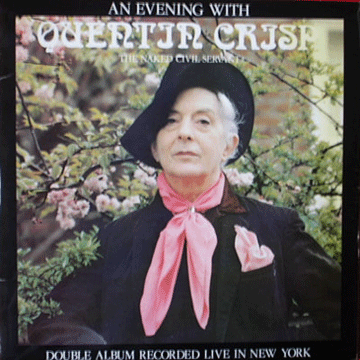 I would spend hours with him in his famous bedsit in the house in Beaufort Street in Chelsea where he had lived for years. We would talk and talk about everything in the world. One day I called him up to ask him what he was up to and he told me with some amazement that a play in the West End (London's theatre district) had closed unexpectedly and that he had been asked to step in and present an Evening with Quentin Crisp for the first time! I was horrified, as the theatre critics in London are merciless. It was one thing to be witty and entertaining at a dinner party but the London stage was quite another proposition. Everyone who knew him turned up to support him and were terrified that he would bomb and have dreadful reviews. No one could bear the thought of him being hurt! Well, of course he was a huge hit and got rave reviews.
I would spend hours with him in his famous bedsit in the house in Beaufort Street in Chelsea where he had lived for years. We would talk and talk about everything in the world. One day I called him up to ask him what he was up to and he told me with some amazement that a play in the West End (London's theatre district) had closed unexpectedly and that he had been asked to step in and present an Evening with Quentin Crisp for the first time! I was horrified, as the theatre critics in London are merciless. It was one thing to be witty and entertaining at a dinner party but the London stage was quite another proposition. Everyone who knew him turned up to support him and were terrified that he would bomb and have dreadful reviews. No one could bear the thought of him being hurt! Well, of course he was a huge hit and got rave reviews.
On the opening night a famous but very neurotic and very alcoholic heiress called Olga Dettering gave Quentin a glamorous party at her penthouse apartment off Piccadilly. Everyone who had been at the theatre was there, plus a few rather dubious characters. Actually, thinking back on it, we were all pretty dubious. Most of us were not exactly accustomed to the flowing champagne and delicious food, which everyone was stuffing down their throats while Olga prowled around in a state of inebriated paranoia accusing people of gate crashing. At one point, she burst into the lavish drawing room and swayed unsteadily towards Quentin, who was in his element basking in his success. She sank to her knees before him and gazed up at him worshipfully. The tension was incredible…anything could happen! Quentin smiled down at her. "Tell me everything," he intoned like a priest in the confessional, and we all sighed with relief.
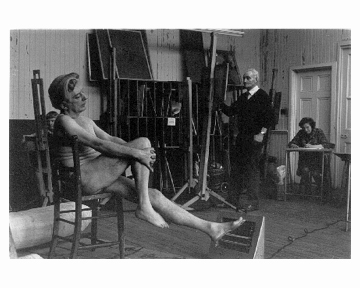 At the time of his theatrical debut, Quentin was posing most mornings at a life class for mature students (the geriatric brigade) in a college deep in the suburbs of outer London, which took at least an hour each way by bus. The next morning we were both on that bus, as I wanted to photograph him as The Naked Civil Servant for which he was so well known. What a model he was... giving it his all, striking fabulously extravagant but excruciating poses, and entertaining the old dears during the breaks with witty anecdotes just as if he was on stage. Quentin always treated everyone exactly the same with courtesy and respect. Whether duchess or dustman, heiress or pauper...it made no difference to him at all.
At the time of his theatrical debut, Quentin was posing most mornings at a life class for mature students (the geriatric brigade) in a college deep in the suburbs of outer London, which took at least an hour each way by bus. The next morning we were both on that bus, as I wanted to photograph him as The Naked Civil Servant for which he was so well known. What a model he was... giving it his all, striking fabulously extravagant but excruciating poses, and entertaining the old dears during the breaks with witty anecdotes just as if he was on stage. Quentin always treated everyone exactly the same with courtesy and respect. Whether duchess or dustman, heiress or pauper...it made no difference to him at all.
After his stunning performance on the London stage, the next step was New York. I happened to be going at the same time and by this time had a large collection of photographs of Quentin, which I thought might possibly be made into a book. That is how I met the brilliant Connie Clausen who became his agent , with much pulling of hair and teeth (metaphorically speaking). Quentin had long been in the clutches of the ghastly Richard Gollner, a great fat repulsive man who was ripping Quentin off royally. Every one tried in vain to persuade him to ditch this awful man, but Quentin being Quentin, he did nothing to stop him, trusting that all would be well in good time, which of course it was. When I showed Connie my photographs and told her what an extraordinary unique being Quentin was, she jumped on the train that night to see him do An Evening with Quentin Crisp at Yale University. It was love at first sight and she was determined to become his agent. On that same trip I took my photographs to Vogue and when Leo Berman, the great editor, heard I was there he came barrelling out of his office and instantly bought one of the pictures and invited Quentin and me to dinner that night at Le Cafe des Artistes , along with A.L. Rowse and Berman's friend Gray, I believe. A more fascinating evening I can't remember.
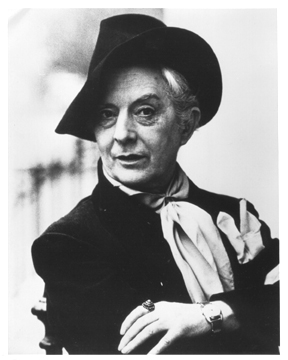 Quentin’s life in New York fulfilled all his dreams and his courage to simply sail off to America in his mid seventies, convinced that America was the Promised Land, a conviction that never wavered, amazed every one who knew him. Connie Clausen, who adored and fiercely protected him (she worried continually that he insisted on living in what she called "the WORST part of New York") helped to make him the great star he became and find the fame and fortune (though no one knew about that until after his death…he always wore secondhand clothes or things people gave him) he deserved.
Quentin’s life in New York fulfilled all his dreams and his courage to simply sail off to America in his mid seventies, convinced that America was the Promised Land, a conviction that never wavered, amazed every one who knew him. Connie Clausen, who adored and fiercely protected him (she worried continually that he insisted on living in what she called "the WORST part of New York") helped to make him the great star he became and find the fame and fortune (though no one knew about that until after his death…he always wore secondhand clothes or things people gave him) he deserved.
It was the best stroke of luck that I happened to be in New York and saw the poster announcing the memorial for him in a window walking home late one night. And that is how I met my great friend, the lovely Phillip Ward who organized the brilliant tribute at the Cooper Union, and we all wished Quentin could have been there but then again, he probably was, gazing down and smiling in that bemused way of his, but not when it came down to it, really surprised.
|

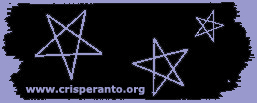
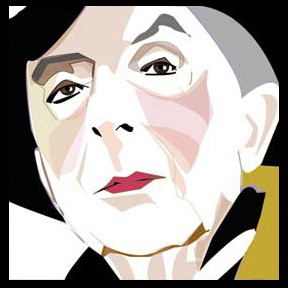
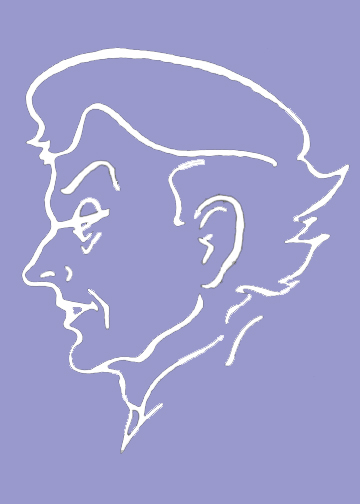




 Quentin’s life in New York fulfilled all his dreams and his courage to simply sail off to America in his mid seventies, convinced that America was the Promised Land, a conviction that never wavered, amazed every one who knew him. Connie Clausen, who adored and fiercely protected him (she worried continually that he insisted on living in what she called "the WORST part of New York") helped to make him the great star he became and find the fame and fortune (though no one knew about that until after his death…he always wore secondhand clothes or things people gave him) he deserved.
Quentin’s life in New York fulfilled all his dreams and his courage to simply sail off to America in his mid seventies, convinced that America was the Promised Land, a conviction that never wavered, amazed every one who knew him. Connie Clausen, who adored and fiercely protected him (she worried continually that he insisted on living in what she called "the WORST part of New York") helped to make him the great star he became and find the fame and fortune (though no one knew about that until after his death…he always wore secondhand clothes or things people gave him) he deserved.